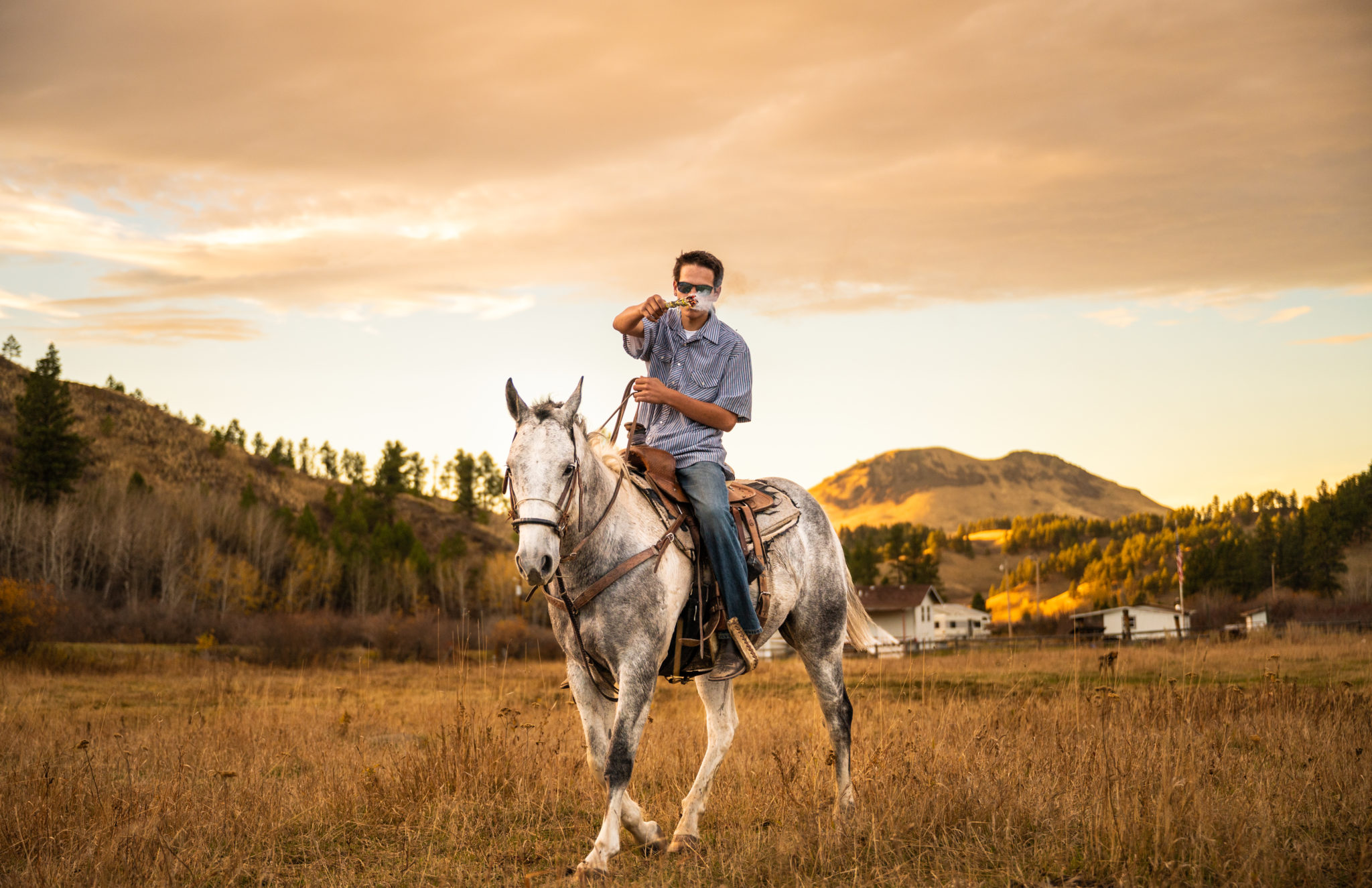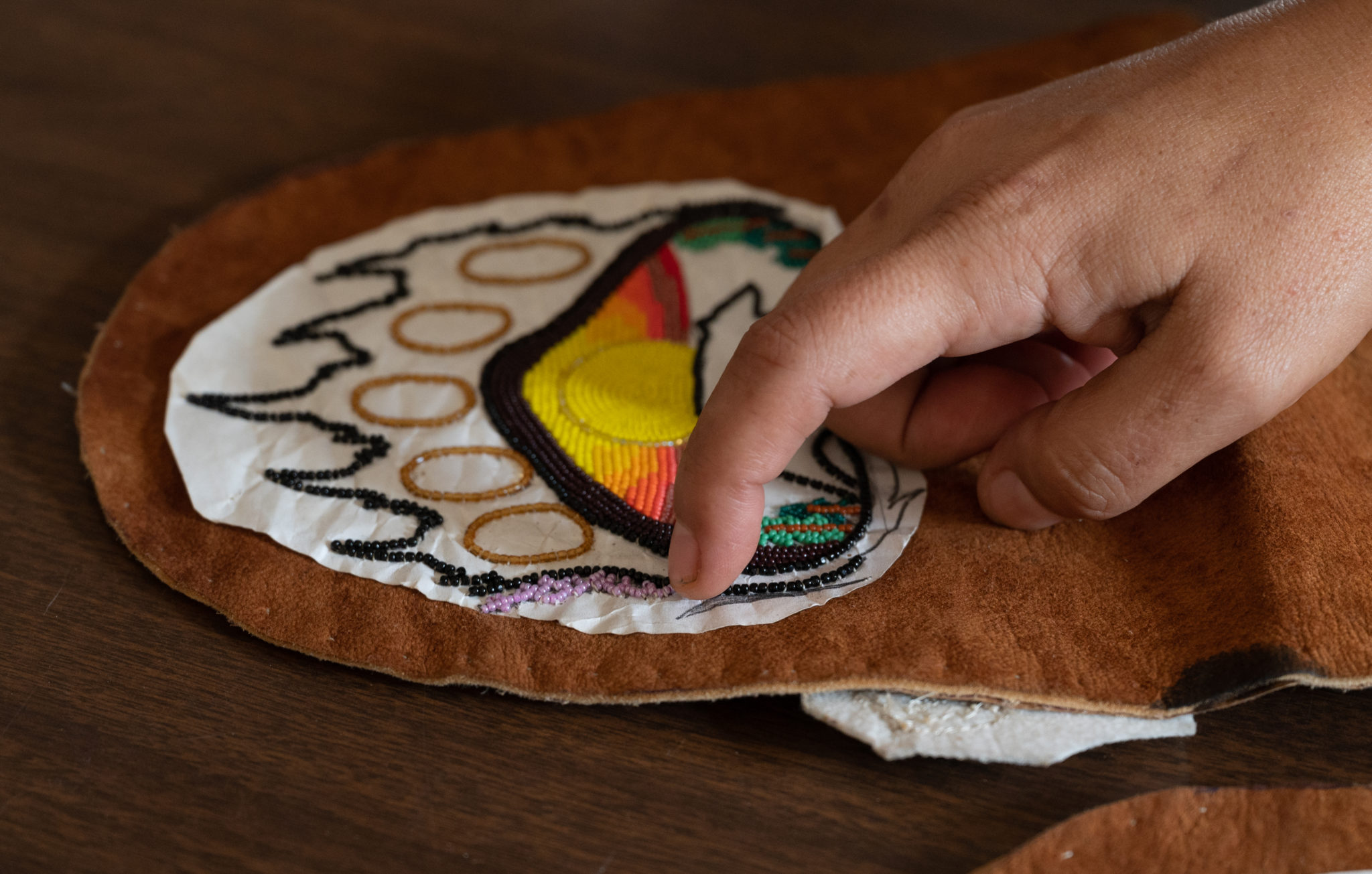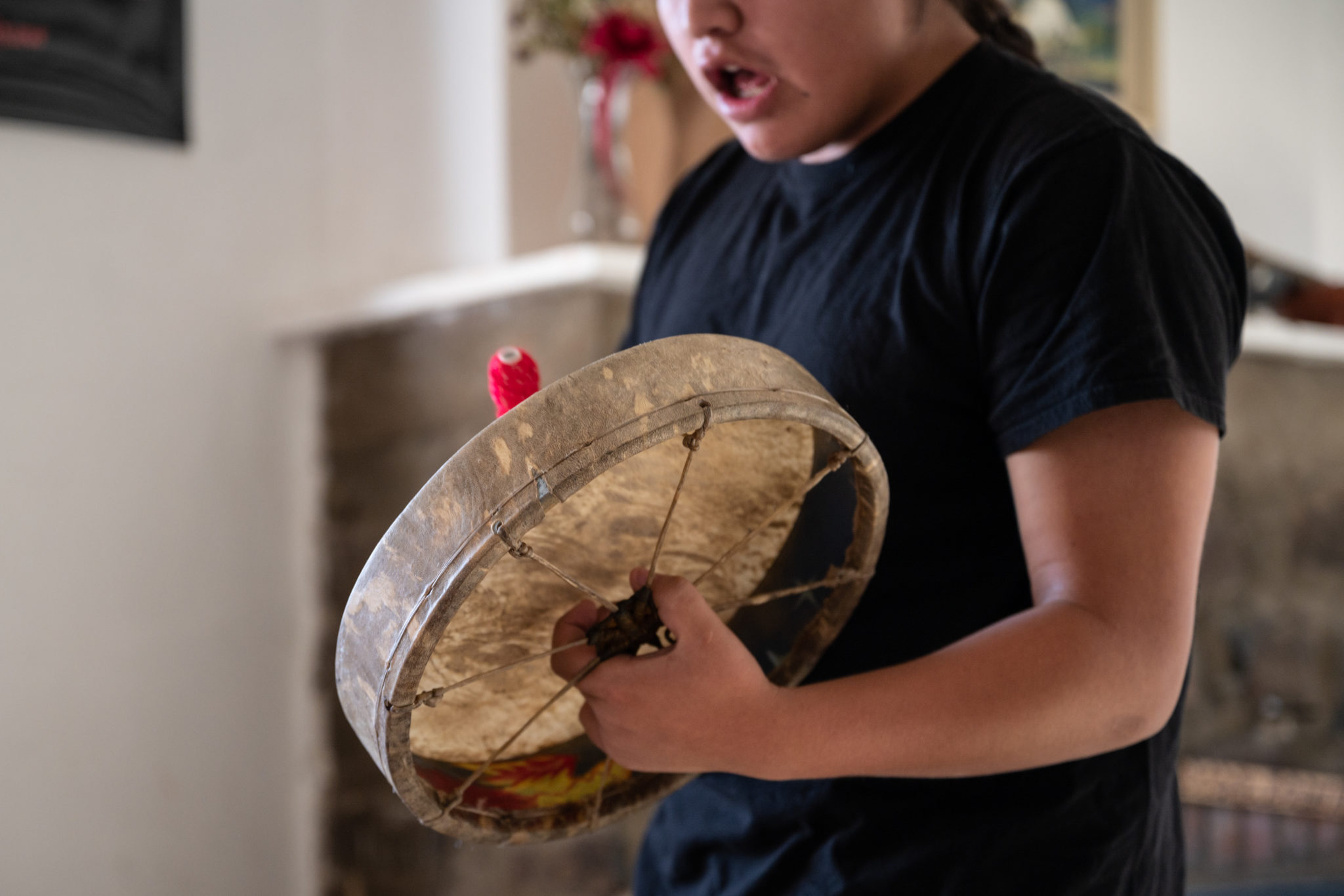
- Details
- By Meghan Elaine
Tiny, intricate beads danced together in unison, forming an array of vivid colors. The hands of 41-year-old Jennifer Tendoy trembled as she grazed the top of a half-finished moccasin. A bear paw drawing was placed carefully on copy paper with smudged pencil marks from where her daughter last drew, two weeks before her daughter died by suicide.
For Tendoy, these must be the perfect moccasins for her son. Her daughter, 18-year-old Charleese Burkybile, would have wanted it that way. As she began meticulously choosing each bead, she recalled her daughter saying, “Mom, you have to shade this like the sunset. There needs to be lavender, and the leaf needs to be sage.”
[Editor's Note: This article was first published by the Daily Monantan. Published with permission. All rights reserved.]
In the same month Charleese died, the Chippewa Cree Tribe declared a state of emergency for the Rocky Boy’s Reservation due to an “alarming” increase in suicide rates. The declaration cited data from the Centers for Disease Control and Prevention, indicating that suicide rates among Native Americans and Alaska Natives are the highest of any demographic nationwide, with 28.1 deaths by suicide per 100,000 people. In response to the state of emergency, the Rocky Boy Health Center offered a series of community events to promote suicide awareness and prevention.
Tendoy’s sister-in-law, Julianne Denny, was at the forefront of creating programs in the aftermath of the increased suicide rates. Denny formerly offered services and classes that promoted a connection to Native American culture at the Office of Victim Services for the tribe. She is currently the multimedia marketer for the Rocky Boy Health Center.
Denny said she approached the wellness coalition to create the emergency declaration following her personal experiences of losing two people to suicide in two weeks. Her niece, Charleese, who died on August 7, 2023, was among them.
“As Cree people, we believe suicide is a spirit just like anger and sadness…. a big teaching of ours is to turn it around, turn the negative into the positive,” Denny said.
Tendoy takes this practice to heart. “I go to different ceremonies to gather my strength,” she said.
The director of strategic development for the Rocky Boy Health Center, Melody Henry, put in efforts to create the Smudge the Rez Tour, spanning two months and every community of the Rocky Boy’s Agency. A poster promoted the tour as “practicing our traditional life ways to protect our community.” Smudging is a practice used by some tribes to burn herbs and allow the smoke to purify and bless people and places.
Henry said her colleagues initially considered organizing a single-day gathering. However, they realized such an approach might not effectively reach enough people. They decided to pursue a series of events to raise awareness among as many individuals as possible.
On October 18, 2023, off a twisting, gravel road of the town of Parker School in Rocky Boy’s Agency, cars caravanned in a uniform line. They slowly descended into a field below a steep, golden-lit hill. Within twenty minutes, laughing children and families flocked into the tall, yellow reed grass. Tendoy was among the crowd with a heavy heart. Henry said this is their medicine.

“It’s hard for us to say this is our prescription when we don’t have an actual prescription… We’re trying to bring our Indigenous knowledge out and say this is important,” Henry said.
During the tour, the center provided residents with harm-reduction packets, including crisis numbers, flyers and information on what to do if someone is harming themselves.
Henry stood in the field on the day of the Parker School event, the second-to-last stop on the tour. She directed the local food truck where to go. Her black hoodie had “Mih yah kah so” written in bold letters, which she said means “go smudge.”
The drum group placed their chairs in a unison circle, and Henry handed out bags of food to people. She said going back to tradition is the best way to fill your soul and be ready to ask for help.
“We will give you some gifts, and we will give you some songs that will ease your mind and help you. We will give you some prayers and sage and nourish you. And on top of that, we will give you some good information,” Henry said. “This is a great way to gain their trust so they will come here and use our facilities.”
Three teenaged boys appeared in the distance on horseback, each with a smoking bundle of sage in hand. They rode their horses with the sage through Parker School, the smoke intended to embrace traditional practices and protect and bless the community.
They rode in unison as the horses’ hooves struck the gravel. The youngest of the group rode his horse across the field, cutting it close to the drum circle and holding the reins with one hand, smoldering sage held high in the other. Fifteen-year-old Bridger Morsette jumped off his dapple gray horse named Bud Light.
“I think I burned through nine bundles of sage,” he said, petting Bud Light’s sweat-drenched shoulder.
He and the other boys were not shy about showing off their equally sweaty horses. They nudged Morsette, laughing, and asked him to talk about depression. Morsette looked down, embarrassed, saying, “I’ve never had that.”
Joking aside, they smiled at each other. Morsette looked out.
“It feels good to be out here,” he said.
The three boys walked back into the crowd, eager to grab a box of warm tacos. They were as tired and hungry as their horses. The boys walked past a woman sitting on a lawn chair. It was Tendoy.
Tendoy said she is weary of criticism from some community members who don’t think she should be attending these events just two months after the death of her daughter.
“They say I should be grieving alone,” she said.
The following day, Tendoy sat in the gathering room of her workplace at the Lutheran Church, where Charleese used to keep her mom company. Tendoy frequently assists with funerals and dresses bodies in traditional wear. She is accustomed to death, but nothing could have prepared her for her daughter’s.
On the mantle of the gathering room sat a seashell bowl with a bundle of braided sweetgrass wildly grown on the rolling hills of the agency. Sweetgrass used to grow in abundance on the Rocky Boy’s Reservation, but today there are only isolated patches.
Tendoy grabbed the braided sweetgrass and began burning its ends. She closed her eyes as smoke wafted around the room. She said her daughter’s Cree name, “Wīkask Iskwēw,” which translates to Sweetgrass Woman.
“My daughter has always been the caretaker for all of us; there was so much loss recently to our whole community. She felt everything. Empathy was her gift,” Tendoy said.
A fragrant smell of sweet, burnt vanilla filled the air.
“Our sweetgrass prays for us, we can be so weak, and in the darkest times, it prays the most eloquent prayer,” Tendoy said.
Two days after Charleese died, family and friends gathered in a field on Parker School Road to say goodbye.
“I knew how to dress her in our proper way the way all of our old people did it…my dad always taught me that is the last thing we can do for them while they are here,” Tendoy said, remembering the preparation.

Eighteen-year-old Tanille Standingrock attended the funeral as flashes of fond memories with her childhood friend rang through her mind.
Standingrock grew up in a little yellow house on Parker School Road directly under Haystack Hill, a sacred area for the Chippewa Cree people. Standingrock said she and Charleese rode their bikes down the gravel road, singing and laughing until their bellies hurt.
They would hike underneath Buffalo Rock, looking over the rolling hills and pine trees sprawling from the agency to Box Elder. But in high school, Charleese came out as a lesbian and was being bullied at school. She decided to move to Washington to be with her father’s family.
After being crowned Rocky Boy Powwow princess, Standingrock was pleased to see Charleese back in town.
“I remember the last time I saw her. She had just returned, and we were at a powwow. She looked at me and smiled, telling me my crown was so shiny,” Standingrock said. She hadn’t known that would be the last time she saw Charleese.
Standingrock still drives the backroads thinking of her friends, family and the undeniable darkness she said lingers in the area.
“I hope this place changes. As it is now, people are being brought up into bad things. This is why it’s the way it is,” Standingrock said.
On November 11, 2023, three months after the funeral, Tendoy and Standingrock attended a Veterans Day round dance. Tendoy wore a skirt covered in various florals, and brilliant shades of orange ribbon wrapped around it symmetrically. This ribbon skirt is the last one Charleese sewed together with a needle and thread.
The evening unfolded in the Rocky Boy High School gym and began with providing food for the participants. The dance announcers spoke in both English and Cree, introducing the welcoming song.
“They call those spirits to come down with us,” Tendoy said.
Standingrock, Tendoy and Charleese’s grandmother stood hand in hand creating a circle around the drummers and singers. They locked their fingers and began dancing slowly and methodically.
“It felt like I was dancing and holding her hand,” Tendoy said.
They danced for hours.
Help us defend tribal sovereignty.
At Native News Online, our mission is rooted in telling the stories that strengthen sovereignty and uplift Indigenous voices — not just at year’s end, but every single day.
Because of your generosity last year, we were able to keep our reporters on the ground in tribal communities, at national gatherings and in the halls of Congress — covering the issues that matter most to Indian Country: sovereignty, culture, education, health and economic opportunity.
That support sustained us through a tough year in 2025. Now, as we look to the year ahead, we need your help right now to ensure warrior journalism remains strong — reporting that defends tribal sovereignty, amplifies Native truth, and holds power accountable.
 The stakes couldn't be higher. Your support keeps Native voices heard, Native stories told and Native sovereignty defended.
The stakes couldn't be higher. Your support keeps Native voices heard, Native stories told and Native sovereignty defended.
Stand with Warrior Journalism today.
Levi Rickert (Potawatomi), Editor & Publisher

